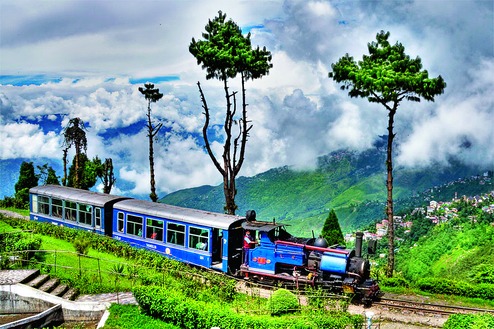
Guwahati, Aug. 8: The ongoing Gorkhaland unrest has caused an estimated Rs 2.5 crore loss to the Darjeeling Himalayan Railway (DHR), rendering a blow to its plan to bridge deficit as the service has remained suspended since June 12.
Officials of the Northeast Frontier Railway (NFR) here, under which the heritage train operates, said the earnings of the DHR had seen 74 per cent increase between April-May in 2017-18 compared to the same period last year. But indefinite suspension of the service since June 12 has forced it to cancel all advance bookings and refund money.
The service was suspended after Sonada and Gayabari stations of DHR were damaged on June 8 and 12 respectively.
The 78km stretch of DHR from New Jalpaiguri to Darjeeling in Bengal, which was later reduced to Siliguri-Darjeeling, became an attraction for tourists and earned the Unesco World Heritage tag in 1999. The DHR has not made profit for more than six decades but earnings from passengers showed encouraging signs with it going up from Rs 5.45 crore in 2015-16 to Rs 7.65 crore in 2016-17. The DHR recorded earnings of Rs 3.05 crore till June 12 this year when the service had to be suspended fearing threats to its employees and safety of the heritage properties.
The annual expenditure of the DHR is estimated to be around Rs 15 crore.
"The DHR had only three trains but the earnings from passengers went up after six new trains were added in 2016-17 between Ghoom station and Darjeeling. But it has come to a standstill now. The loss will go up as the damage to properties has not been ascertained yet because of the unrest," NFR chief public relations officer Pranav Jyoti Sharma said here today.
The NFR headquarters situated here at Maligaon covers railways in the Northeast, parts of north Bengal and up to Katihar in Bihar.
Protesters had also tried to set fire on the Elysia building (the headquarters of DHR) in Kurseong on the night of June 13.
Additional security personnel have been posted to protect DHR facilities in Darjeeling, Ghoom, Kurseong, Tindharia, Rongtong and Sukna, fearing further damage.
"Our Katihar division, under which the DHR operates, is in touch with the Bengal government and letters have been sent to the chief secretary and home secretary," Sharma said.
"During the ongoing agitation, the railway assets and structures are being constantly targeted by miscreants and posing a grave threat to safety of the assets. These structures, once destroyed, will not be restored and the nation will lose its valuable heritage. It will also attract very adverse reactions from across the world," said a recent letter from C.P. Gupta, divisional railway manager, Katihar, to the Bengal home secretary.
The DHR, which started operations in 1881, was primarily built for freight traffic but was turned into a passenger railway service, attracting tourists from across the world. The DHR signed a memorandum of understanding (MoU) with Heavy Engineering Corporation Limited on May 9 this year for redeveloping, manufacturing and supply of spares for the narrow-gauge steam locomotives.
The World Heritage Centre of Unesco had expressed concern over the damage caused to DHR properties.











